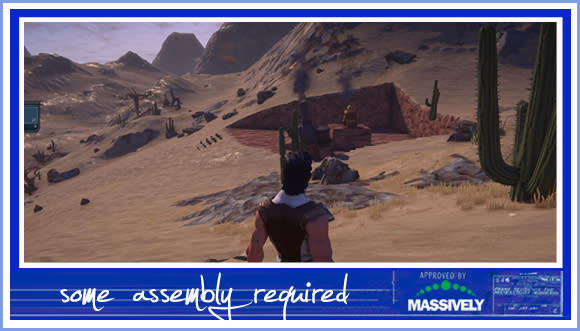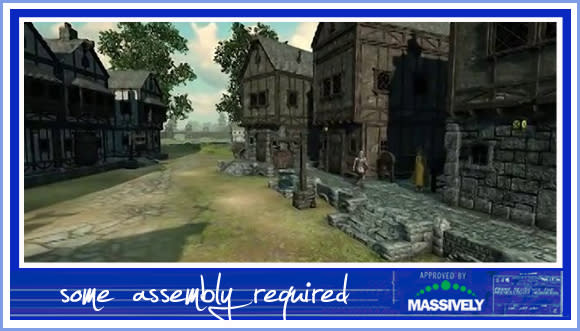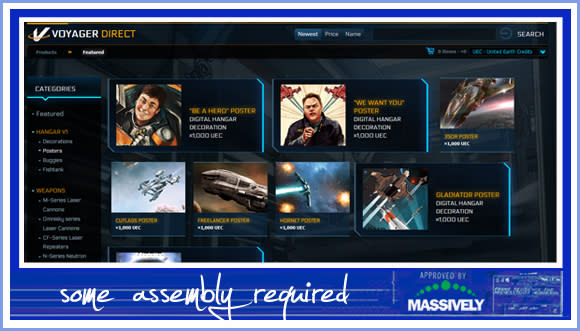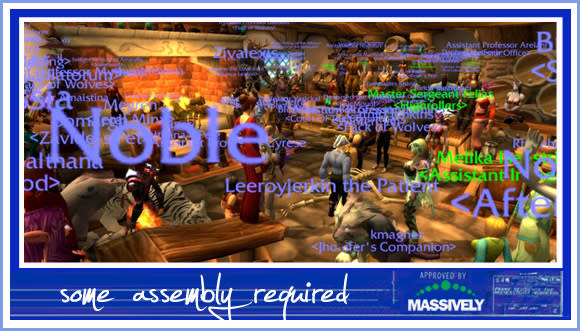Some Assembly Required: Is this really the sandbox renaissance?
It's funny, but this whole sandbox renaissance feeling has got me a little worried. I'm of course ecstatic at the number of sandbox MMOs currently in development, and I'm even happier that one triple-A outfit has finally acknowledged that MMOs are supposed to be sandboxes.
EverQuest Next and Landmark aren't the only reasons to be amped, either, as games like Star Citizen, Elite: Dangerous, and The Repopulation are all putting their own spin on emergent virtual worlds and standing on the shoulders of genre giants.
It's not all roses, though, and amidst the cautious optimism on display from starving sandbox fans, I feel the need to remind myself of the various personal pitfalls that still need to be addressed.


A while back I opined that SOE was the ideal company to carry the MMO sandbox banner. For the most part, I still believe that, given what I've seen of Landmark thus far and what I know of the company's design history. That said, some of CEO John Smedley's recent comments give me pause, as does his long-term involvement in EVE Online's community.
I'll probably catch some (more) flak from EVE die-hards here, but it's worth repeating the fact that EVE is not the quintessential sandbox. This is because it features no actual consequences for bad behavior -- actually it encourages and celebrates asshattery more than any other MMO -- and thus it's little more than a sci-fi Lord of the Flies in spite of some terrific game mechanics and technical innovations.
Think about it. All of the sensational EVE stories that we love to read about -- and that very few of us have actually experienced -- are always the same story. Corporation XYZ screws corporation YYZ, and the result is a gigantic slideshow of a dot-sized spaceship battle that costs however many millions in PLEX damages and theoretical real-world money loss.
Yawn.
You rarely, if ever hear about a player building something; it's all destruction, espionage, metagaming, and people finding newer and more novel ways to backstab one another. That's great if you're into that sort of thing, but not every sandbox fan is, and therefore it's folly for SOE or anyone else to pattern their future sandbox development exclusively after EVE. Player freedom is necessary, sure, and that's the part that CCP gets right. But unchecked player freedom leads to anarchy and ultimately the same sort of repetition, boredom, and burnout that themeparks have perfected over the past decade.


Then we have Pathfinder Online, which is one of the MMO genre's more noteworthy Kickstarter successes and which has built a substantial fan following for itself based on the promise of its no-holds-barred design.
The problem with Pathfinder, apart from the PvP-only aspect that I've broken down several times before, is something that GoblinWorks CEO Ryan Dancey calls "minimum viable product." The thinking seems to be that all a dev team need do is build a combat engine and associated conflict systems and then throw players into the mix and let them make of it what they will.
I'm sure this is a cost effective approach, and it's probably ideal for "small, agile" indie development teams like GoblinWorks. Will it make for a full-featured persistent world, though, or just another combat lobby? Time will tell, but the bar for sandbox games is Ultima Online and Star Wars: Galaxies, not PlanetSide or its fantasy equivalent. In other words, the bar is titles that have a huge range of non-combat gameplay to go along with their ultraviolence. The fact that said titles were possible over a decade ago and on a fraction of today's budgets is also an interesting bit of trivia.
Maybe Pathfinder will work its way up to being a full-fledged sandbox, assuming it limits itself to PvP at release. And then again maybe it won't because aside from the hardcore early adopters and the smallish open-world PvP crowd, how many potential sandbox fans are going to pay to play what currently amounts to another Darkfall?


Still another reason to be wary of the supposed sandbox renaissance is the fact that the games industry has changed radically from what it looked like when sandboxes ruled the MMO roost. Casual, game-hopping players vastly outnumber loyal gamers with lots of time on their hands, and even more importantly, MMOs are now designed for monetization first and gameplay second.
Yes, I'm talking about free-to-play, and no, I'm not at all sure that it will allow the type of sandbox MMO I love to be successful. Games like Pathfinder, EVE, Camelot Unchained, and others are wisely sticking to the sub model, and good for them because it just makes things simpler from a design and production perspective. SOE, on the other hand, is trying to convince itself and its customers that F2P won't undermine the in-game meritocracy that an MMO sandbox is.
How it's going to manage this without turning EQN or Landmark into a cheesy Planet Calypso-style flea market is something I'm curious to see. Actually curious is the wrong word. I'm uneasy as hell about it.
And Star Citizen, despite avoiding the F2P label on a buy-to-play box fee technicality, is likewise going to be relying on its cash shop past launch. Cloud Imperium has pumped out the usual anti-pay-to-win rhetoric, but it's simply too early to know how it's going to work in practice. So the smart money is on "not well for the immersion-conscious consumer."
I've written before about how F2P could possibly pan out in a sandbox MMO, but my solution relied entirely on a developer reigning in its greedier instincts and refraining from selling anything other than account-related items in its cash shop. Hawking convenience items unequivocally undermines sandbox gameplay, and selling fluff cosmetics cuts crafters out of the in-game economy. Making a profitable F2P sandbox on revenue streams limited to server transfer fees, character renames, and similar stuff seems incredibly challenging and unlikely to happen.


The final consideration that's keeping me from throwing up my hands and joyously proclaiming that we're in the midst of a sandbox renaissance is the people involved. And by people, I mean players. This concern dovetails with the previous bit about changed business models because today's MMO consumer bears little resemblance to the consumer who paid for MMO sandboxes in prior years.
In short, gamers have grown up. And they've been replaced by a generation weaned on World of Warcraft and largely indifferent to virtual worlds, sandboxes, and the like. Older sandbox fans now have kids and mortgages and less time to devote to MMOs, and so companies naturally changed the product to cater to the newer, larger demographic. The result is a slew of content-driven grindparks that busy but monied adult gamers can solo or pay their way through. And the result is also a sea change in the perceptions of what an MMORPG actually is.
The term no longer means virtual world but rather a linear level- and class-based exercise in avatar progression, gear grinding, and pre-generated content consumption. While there's a certain delicious irony inherent in someone like John Smedley acknowledging that content locusts are slowly but surely killing the genre they created, whether worthwhile sandboxes in the vein of UO and SWG will rise from those ashes is anyone's guess.
I'm not convinced that they will, but I'm hopeful. At the very least, I expect a few additional companies to wake up to the demand for more intimate and customizable experiences, like Cloud Imperium's decision to offer Star Citizen private servers at launch. This kind of thing is right up my alley because originally I started playing MMOs for the sandbox and virtual world mechanics that I couldn't get in single-player titles. The "massively multiplayer" part of the equation was a personal afterthought. It was cool in a way because it seemed like the majority of the people playing were playing for the same reasons I was in those days, but even so, community wasn't the draw.
In 2014 community is still not my primary draw, and more crucially it's become a hindrance since so many newer players are actively hostile toward sandbox mechanics. I don't want to play MMOs with people who dismiss their virtual world possibilities, in the same way that I don't want to attend a Rush concert with someone who dislikes progressive rock. Call it elitism if you must, but in reality it's the desire for shared experience with fellow fans.
Ultimately, if this new sandbox renaissance is in fact a renaissance and if it can both get the mechanics right and attract a community that appreciates them, I'll be in hog heaven. If not, eh, I guess it'll just be business as usual.

Every two weeks, Jef Reahard and MJ Guthrie take a break from their themepark day jobs to delve into the world of player-generated content. Comments, suggestions, and coverage ideas are welcome, and Some Assembly Required is always looking for players who'd like to show off their MMO creativity. Contact us!


